
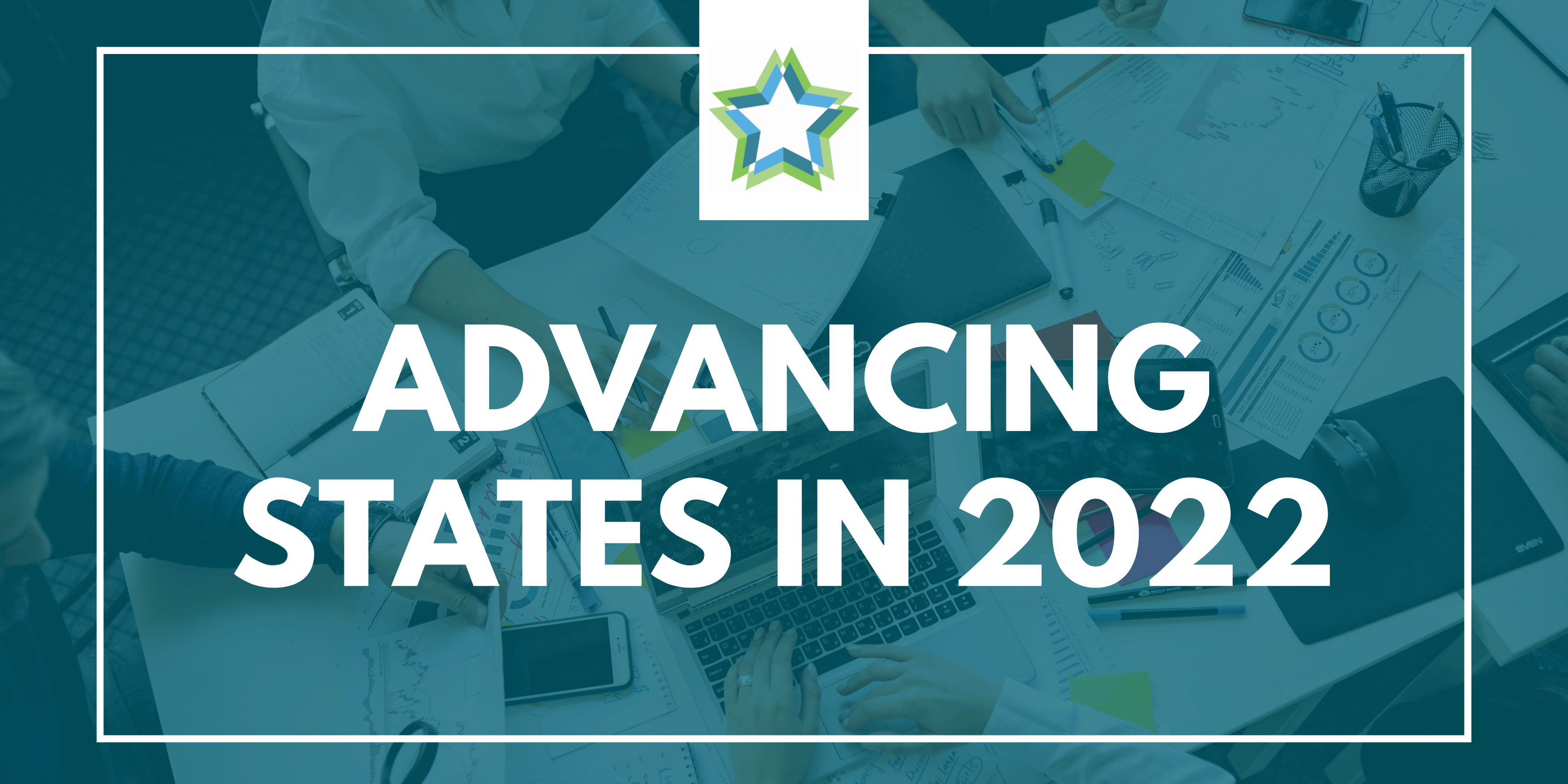
Our vision at ADvancing States is for all older adults, individuals with disabilities, and their caregivers to have access to the resources they need to live well and thrive in every community.
2022 was a critical year for our members. While still attending to the challenges caused or compounded by the COVID-19 pandemic, state leaders in aging and disability are preparing for the eventual end of the federal COVID-19 Public Health Emergency (PHE). In addition, states are tasked with implementing the Home and Community-Based Services (HCBS) Final Settings Rule, operationalizing one-time American Rescue Plan Act (ARPA) funds, and addressing a direct care workforce shortage that has reached crisis levels in every state. Throughout this challenging and exciting time, ADvancing States has continued to support visionary state leadership, the advancement of state systems innovation, and the articulation of national policies that sustain long-term services and supports for older adults and individuals with disabilities.
Below is a look back at some of our achievements of 2022.
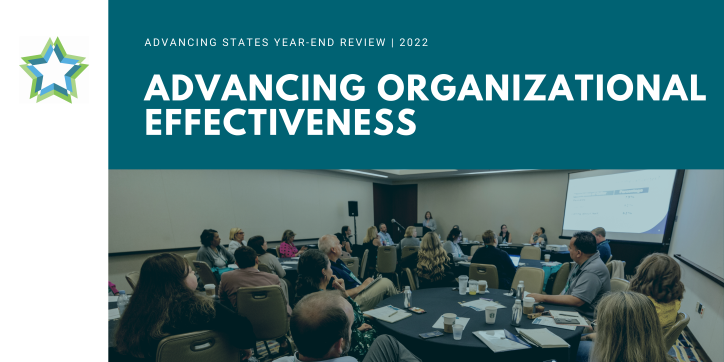
ADvancing Organizational Effectiveness
National HCBS Conference
The 2022 National HCBS Conference was the largest ever, with more than 1,500 attendees. As the host of the only national conference that annually brings together state, federal, and local HCBS policymakers, as well as leaders who administer, manage, and deliver waiver and other HCBS programs, ADvancing States understands the critical importance of face-to-face opportunities to share ideas, practices, and policies. Participants at the 2022 Conference had opportunities to share, learn, listen, and network at over 130 different sessions — plenaries, workshops, breakouts, demonstrations, nightly social events, and one incredible dance party. We are grateful to keynote speakers Alison Barkoff, Administration for Community Living (ACL) Acting Administrator and Acting Assistant Secretary for Aging, and Daniel Tsai, Deputy Administrator and Director of the Center for Medicaid and CHIP Services. We are especially lucky to have had a superb plenary panel of direct service workers share their experience, concerns, and policy recommendations with attendees.
The Conference presents an unmatched opportunity to meet and collaborate with counterparts and colleagues from across the country. The Call for Sessions for the 2023 Conference will open in January, so please take these next weeks to brainstorm creative ideas for your proposal, reach out to states, and think of innovative ways you can bring collaboration and engagement to the conference. Click here to sign up for the HCBS mailing list to receive conference news.
Next Gen and Alumni Leadership Networks
Also launched in 2022 was our Next Gen HCBS Leaders program, which offers a unique opportunity for emerging leaders in the LTSS field. Participants in this highly selective program develop leadership and management skills, deepen subject matter expertise, and collaborate with counterparts, with the goal of preparing to step into senior management positions when the current cohort of state leaders retires. We look forward to releasing applications in January 2023 for the next class of emerging leaders. Complementing the Next Gen program is our Alumni Leadership Network, comprised of former state and federal employees who worked in LTSS. A reinvigorated Alumni Network participates in quarterly calls, attends Next Gen webinars, advises ADvancing States leadership on public policy matters, and offers mentoring and guidance to Next Gen leaders.
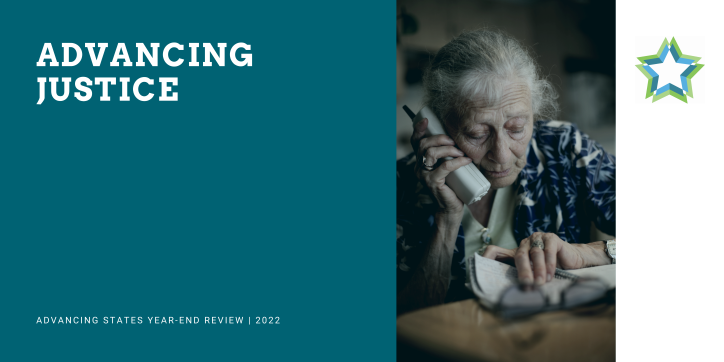
ADvancing Justice
Earlier this year ADvancing States was thrilled to bring on Kathy Greenlee to spearhead new work in elder justice. According to the National Adult Maltreatment Reporting System, 50% of APS cases nationwide concern people experiencing self-neglect. Under Kathy’s direction, ADvancing States conducted an all-state survey of state Adult Protective Services (APS) programs, the results of which demonstrated a high-level of interest from states in joining a multi-state workgroup on self-neglect, which convened for the first time at our 2022 HCBS Conference. The self-neglect workgroup identified issues that will be central to this discussion, primarily the services and supports needed by people experiencing self-neglect and innovations in financing these services. Additionally, a subcommittee is being organized of states interested in exploring, in-depth, ways in which the Medicaid state plan and waivers can provide additional support to these complex APS clients. Additionally, during the National Adult Protective Services Association (NAPSA) conference, ADvancing States conducted a workshop on three points of intersection between the Medicaid program and state APS, highlighting the growing need for data sharing across the programs.
In 2022, ADvancing States also engaged with Washington State’s APS program to explore better solutions for providing support for clients experiencing self-neglect. As a result of our stakeholder outreach, surveys, and analysis, the APS program is exploring a change in protocol, moving away from confirming a person has neglected themselves, to substantiating that a person is in need of protective services.
We look forward to continuing to lead the essential work in this developing field, including the release of full updated version of a report published by our organization in 2012.
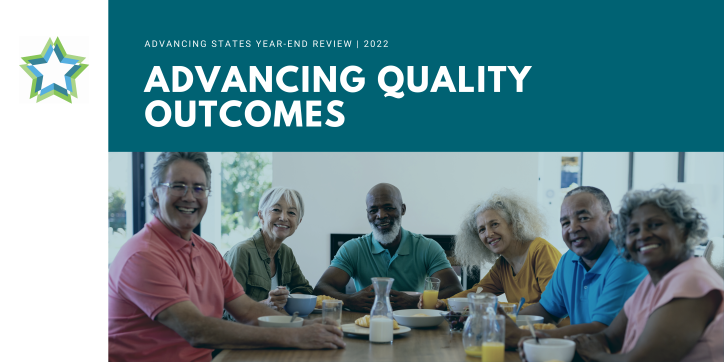
ADvancing Quality
National Core Indicators-Aging and Disability (NCI-AD)
As part of ADvancing States’ goal to advance robust quality monitoring across LTSS systems, we are proud to report in 2022 that the National Core Indicators – Aging and Disabilities (NCI-AD™) was validated by CMS for the first-ever HCBS Quality Measure Set. NCI-AD™, a joint project of ADvancing States and the Human Services Research Institute (HSRI), brings an important value proposition to the field of aging and disability services through development of indicators and outcomes that assess quality of life, community integration, and person-centered services.
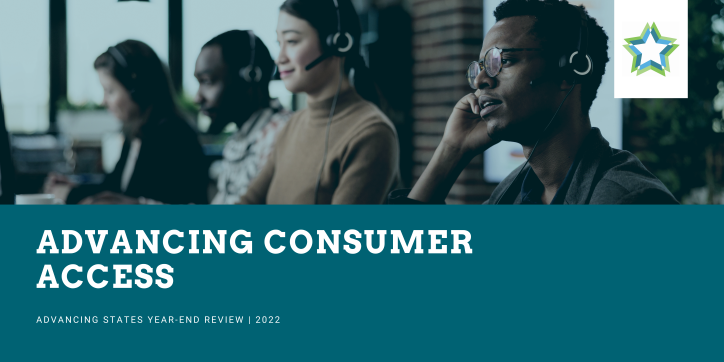
ADvancing Consumer Access
At the center of a well-functioning LTSS system are information and referral/assistance (I&R/A) professionals — the specialists who answer questions and connect individuals, families, and communities to necessary resources and services. In 2022, we celebrated 30 years of one of our key initiatives — the National Information & Referral Support Center — which strives to improve the core foundation of I&R/A professionals through training, certification, technical assistance, and the sharing of news, research, and best practices.
Throughout the COVID-19 pandemic and a wide range of disaster and emergency situations, I&R/A programs have played a vital role in connecting individuals, caregivers, and families to needed services and resources. This year we were excited to hold a contest to identify promising practices that can help strengthen current and future disaster readiness and response within the Information & Referral/Assistance (I&R/A) field. Profiles of contest awardees are available at http://www.advancingstates.org/initiatives/information-and-referralassistance/ir-news.
Additionally, ADvancing States, with support of the National Council on Aging (NCOA), was pleased to release an issue brief on the No Wrong Door (NWD) System initiative, describing the fundamentals of NWD Systems and state partnerships with community-based organizations. As the long-term services and supports system can be difficult to navigate and understand, a state’s No Wrong Door System can help older adults and people with disabilities learn about and access services and supports through a coordinated point of entry.
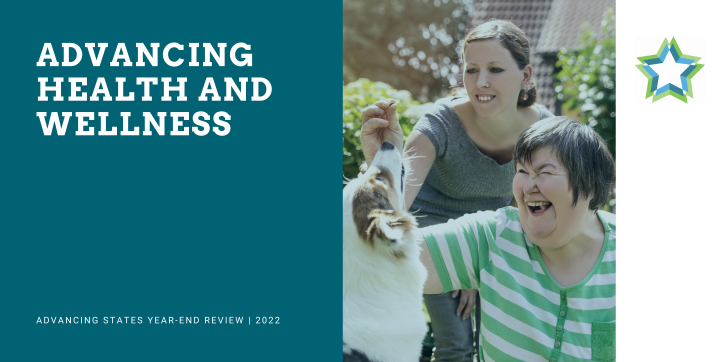
ADvancing Health & Wellness
ADvancing States continued to provide technical assistance to states on aging-related topics, including the Older Americans Act (OAA) and other state-only programs; offer training, education, and technical assistance in Business Acumen for community-based organizations (CBOs); and ensure strong public policy and advocacy in support of programs that support services for people who are aging, people with physical disabilities and their caregivers
ADVancing States continued to play a lead role in the national conversation on Electronic Visit Verification (EVV) implementation under the 21st Century Cares Act, advocating on behalf of our members to reduce costs for states while remaining in or achieving compliance.
In June, ADvancing States submitted comments on the Administration for Community Living’s (ACL) Request for Information (RFI) regarding potential changes to the Older Americans Act (OAA) regulations. In the letter, we offered a wide range of recommendations to update antiquated language; remove or modernize obsolete rules; and strengthen the regulatory framework governing the OAA. The full letter is available here and we expect updated regulations will be issued in early 2023.
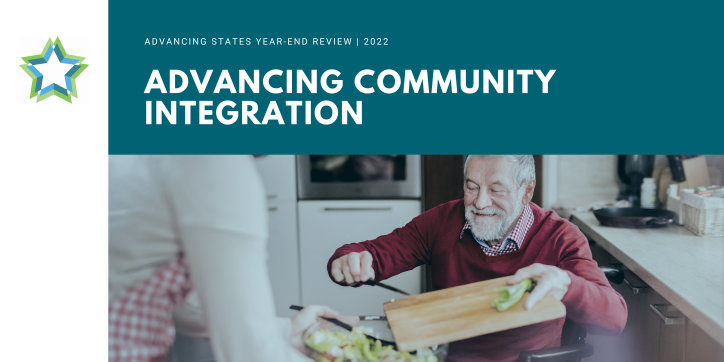
ADvancing Community Integration
2022 was a historic year for Home and Community-Based Services (HCBS), as states began to operationalize enhanced funding from the American Rescue Plan Act (ARPA). The 10% Federal Medicaid Assistance Percentage (FMAP) enhancement on Medicaid expenditures for HCBS represents the largest infusion of new federal resources into the nation’s HCBS system over the last 30 years. With this one-time limited matched funding expiring in 2025, ADvancing States and its partners in the ARPA HCBS Technical Assistance Collective (TA Collective), with the generous support of the John A. Hartford Foundation, the SCAN Foundation, The Millbank Memorial Fund, and Arnold Ventures, are able to provide three rounds of quick-turnaround technical assistance to states on the implementation of their ARPA Spending Plans. The TA Collective was pleased to release two briefs in 2022 — one detailing state strategies to support direct service workers (DSW); another on state initiatives to expand access to enabling technologies.
In addition to working on numerous state integration initiatives, our MLTSS Institute continued its collaboration with national Medicaid health plans to guide improvements in important MLTSS policy areas. Since 2016, the Institute has published eight issue briefs on topics ranging from MLTSS tools to help address the workforce crisis to state considerations for implementing integrated care programs. In April, ADvancing States and Millman released its latest issue brief, Addressing Nursing Facility Challenges during MLTSS Program Development, which sheds light on the complex and often-misunderstood relationship between nursing facility financing and Medicaid delivery system design.
Direct Care Workforce Initiatives
ADvancing States recognizes the magnitude of the workforce crisis and how it has been exacerbated by the COVID-19 pandemic. Creating an environment where strategies to recruit, retain, compensate, and provide career advancement opportunities for DSWs will be crucial to supporting the health and dignity of older adults and people with disabilities. In 2022 ADvancing States launched several initiatives to help address the workforce crisis. Current initiatives include the development of a first-of-its-kind state DSW Advisory Board composed entirely of working direct service workers, ConnectToCareJobs.com, as well as participation in the ACL Direct Care Workforce Capacity Building Center.
In 2022 we were pleased to announce the participation of five pilot states in the State of the Workforce (SotW) Survey, collects and maintains valid and reliable provider-reported data about the status of participating states’ direct support professionals (DSP) and direct service workforce (DSW). The project is a collaborative effort between ADvancing States, the Human Services Research Institute (HSRI), and pilot states, and is based on the Staff Stability Survey-Intellectual Disabilities (SSS-ID), first launched in 2014, and developed in partnership between National Association of State Directors of Developmental Disabilities Services (NASDDDS) and HSRI. We hope data from this tool can be used to better support states and the federal government in their efforts to strengthen the direct care workforce.
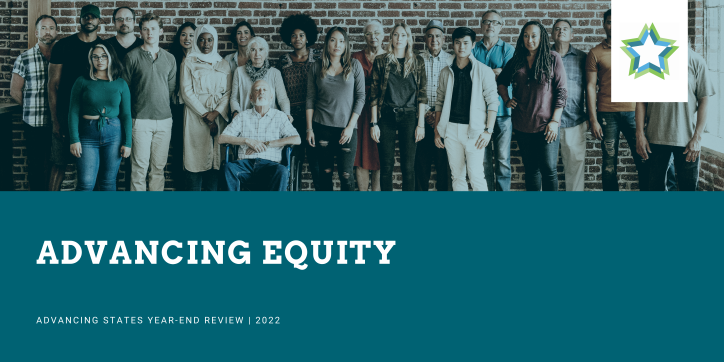
ADvancing Equity
In September 2021, ADvancing States started two new groups to address equity issues: the ADvancing Equity Group and the Rural LTSS Collaborative comprised of state leaders and health plan executives. These groups, including more than half of the states, were able to share tools, resources, and experiences. Over the past year, both groups have met regularly, forged partnerships and enhanced resources to address equity issues in long-term services and supports (LTSS). The groups gave the Administration on Community Living (ACL) feedback on how its programs could be more equitable. The group had presentations from the Centers for Medicare and Medicaid Services, NORC at the University of Chicago, Sage USA, and the American Institute for Research (AIR). The group has provided feedback and support for several ongoing research projects to address data issues in equity and identify state and health plan best practices. Additional opportunities for new participants will be opening up in January 2023 to continue the work to Advance Equity in LTSS.

